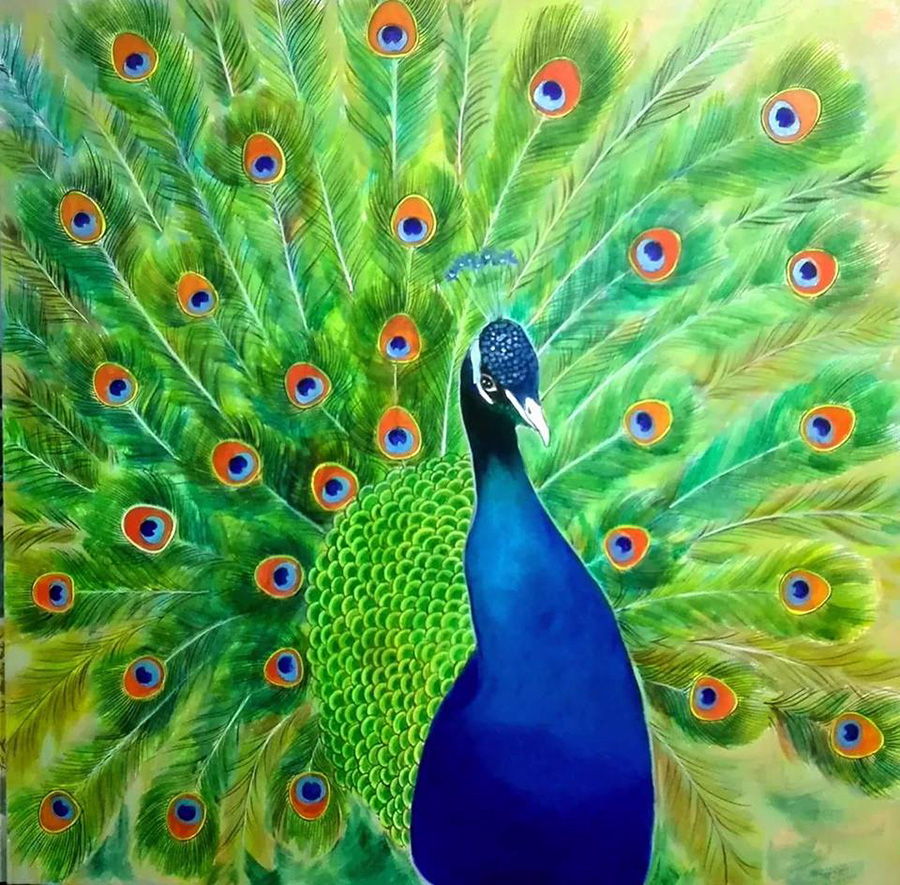The Irrawaddy Magazine |
- How Painting Peacocks Brought an Artist Peace of Mind
- Third Session of Panglong Peace Conference Pushed Back to May
- Philippines Says Any South China Sea Energy Deal Must be With Chinese Company, Not Govt
- India Approves “Historic” Law to Jail Traffickers For Life
- “Forgetful” Myanmar Witness in Reuters Reporters’ Case Writes Key Detail on His Hand
- Peace Can’t Be Bought
| How Painting Peacocks Brought an Artist Peace of Mind Posted: 01 Mar 2018 06:39 AM PST Myanmar artist Ko Su brought a peacock from his native Mandalay's Mingun as a gift for State Counsellor Daw Aung San Suu Kyi, whose party, the National League for Democracy, famously uses a fighting peacock as its symbol. It's not a real peacock, but a painted one, to be exact, rendered in the Chinese style. Ko Su is known for his Chinese-style paintings of bamboo plants and peacocks.
"In Chinese and Korean movies set back in imperial times, you see pictures that symbolize [the characters'] thoughts and stances. Similarly, I want Daw Aung San Suu Kyi to have paintings that symbolize her at work and at home," Ko Su said. "I have always wanted to give her a painting of a fighting peacock. But, as she is leading the peace process now, I have created a peacock in a cool, blue color," Ko Su said. Viewing Ko Su's swaying bamboo plants and paired birds creates a peaceful feeling in the viewer. "My mind is at peace when I paint bamboo groves," he said. Over the past 35 years, Ko Su has taught himself to paint in the Chinese style from Chinese books, comics, and calendars. Sometimes he orders books from Taiwan, and occasionally he travels to the border towns of Muse and Namhkam in Shan State, or to Ruili in China, to buy books.
"Now you can buy books easily. I remember traveling to that region when the border areas near Muse and Namhkam were still unstable, back in the 1980s. To get there, I paid a monk's travel expenses and pretended to be his disciple," the 58-year-old artist recounted. Now, the fruit of Ko Su's decades of effort are on display at the "Peacocks in the Bamboo Forest" exhibition, his second solo show. The exhibition is being held through March 9 at OK Art Gallery at Aung San Stadium (North Wing) in Yangon. Over 20 paintings will be displayed and can be purchased for $50-$1,000. Ko Su will also demonstrate his Chinese-style painting technique during the exhibition. The post How Painting Peacocks Brought an Artist Peace of Mind appeared first on The Irrawaddy. |
| Third Session of Panglong Peace Conference Pushed Back to May Posted: 01 Mar 2018 03:29 AM PST CHIANG MAI, Thailand — Due to the delay in convening national level dialogues, the planned third session of the 21st-Century Panglong Union Peace Conference (UPC) has been moved to early May. The tentative date was agreed at the Joint Implementation Coordination Meeting (JICM) on Wednesday, according to U Zaw Htay, a spokesman for the State Counsellor's Office. The government's initial plan was to hold a session of the peace conference every six months, but the meetings have fallen behind schedule, with the last one held in May 2017. Ethnic-based national-level dialogues have not yet been held in conflict-torn Rakhine and Shan states. The New Mon State Party (NMSP), which recently signed the Nationwide Ceasefire Agreement, will hold the Mon National Dialogue in Yay Township, said Dr. Salai Lian Hmung Sakhong, vice chairman of the Union Peace Dialogue Joint Committee (UPDJC). Nai Aung MaNge, a central committee member of the NMSP, told The Irrawaddy that the Mon National Dialogue will be held on March 23, after public consultations at five venues in areas under its control in Kawkareik and KyarInn Seik Gyi townships in Karen State and Yay Township and Three Pagoda Pass in Mon State. In January, the Restoration Council of Shan State (RCSS) canceled the planned Shan National Dialogue after the Myanmar military (or Tatmadaw) obstructed the holding of public consultations. The government supported the Tatmadaw's actions. U Zaw Htay said the UPDJC are discussing with the RCSS how to move forward. It has held 14 public consultations but has yet to hold the national dialogue (ND) in Longkho as it has five more consultations to conduct, in Taungyi, Kyauk Mae, Karli and Panglong townships in Shan State, and Mandalay. On Tuesday, the UPDJC discussed possible approaches that the RCSS could take to conducting the ND, which is considered the key mechanism for gathering public recommendations to share at the UPC. U Zaw Hay said the government is awaiting a response. According to Dr. Salai Lian Hmung Sakhong, the UPDJC has come up with two options for the RCSS to be able to convene the national-level dialogue. He did not provide details, but said the RCSS representatives would share the options with the organization's leadership and submit a response. "So we hope the current deadlock with RCSS will be broken and we can move forward," he said. The Arakan Liberation Party, an NCA signatory, proposed holding its public consultations in Kyauk Phyu, Mrauk-U, Taunggup and Sittwe in Rakhine State, and in Yangon, U Zaw Htay said. "Because of the Rakhine State situation, we are not able to do it, even though the government, Tatmadaw and the Parliament gave their consent, and both UPDJC and JICM have agreed to conduct the ND in Rakhine. But we will keep trying our best," he told the reporters on Wednesday in Naypyitaw. Stick to the deal, Tatmadaw says The peace process is stalled due to a lack of adherence to the decisions agreed between the government, Tatmadaw and the ethnic armed organizations (EAOs), said Vice Senior General Soe Win, the deputy commander-in-chief of the Tatmadaw, on Wednesday. He made the remarks while delivering the opening speech at the 7th JICM held at Naypyitaw's National Reconciliation and Peace Center. The Tatmadaw deputy chief urged each signatory "to strictly follow the decisions" the parties have made together. He was referring to the terms of reference drafted and approved by all sides. Vice Sen-Gen Soe Win said, "There was a misunderstanding, as there is no description of a prior-public consultation [process] in the decision made at the meeting. Thus the process has stalled and dragged on. If we just follow our JICM decisions, the issues will be solved." He referred specifically to the cancelled Shan national-level dialogue led by the Restoration Council of Shan State (RCSS) in January, following the Tatmadaw's obstruction of the Shan public consultation process. At the last JICM meeting in November 2017, the decision to hold the Shan ND in Longkho (Linkhay) Township was made as the Tatmadaw opposed holding the talks in the Shan State capital, Taunggyi. The Tatmadaw insisted there is no need to hold prior public consultations before the national-level political dialogues, pointing out that in the government-led dialogue process, participants shared their thoughts at the regional level without first holding prior consultations. The EAOs have said the smaller prior public consultations are a crucial means of including local people's views, as the smaller consultations allow contact with the public and an opportunity to listen to their concerns and perspectives on federal Union-building. The RCSS has already said that their public consultations are in accordance with the bilateral agreement and with a "gentlemen's agreement" on the process, adding that the prior national-level dialogues in Karen, PaO and Chin were done after holding public consultations. Negotiations have faced setbacks and deadlocks due to the Tatmadaw's rigid stand on its six-point principles for the peace process and reluctance to allow public gatherings in ethnic states. The military commanders insist that the stakeholders follow their orders, instead of negotiating. More delegates to NCA bodies As there are now 10 EAOs that have signed the NCA, leaders at Wednesday's JICM decided that nine EAOs would be JICM representatives, excluding the Lahu Democratic Union (LDU), given its lack of military power. LDU leaders on Wednesday joined JICM as observers, according to JICM representatives. Dr. Salai Lian Hmung Sakhong, vice chairman of the UPDJC, said both the LDU and NMSP had become full members of the UPDJC and could participate in its working committees. The number of UPDJC members will be unchanged, as it has 16 members each from the government (including the Tatmadaw and lawmakers), EAOs and political parties. Seats are reserved for the 16 government-recognized ethnic armed groups. In addition, Dr. Aye Maung, a UPDJC member from the Arakan National Party (ANP) — one of 16 members representing political parties — who is now detained and standing trial, was replaced by U Oo Hla Saw, a lawmaker representing the ANP. Dr. Aye Maung is also an Upper House lawmaker from Ann constituency. He won the by-election in April 2017. State Counsellor Daw Aung San Suu Kyi, delivering the opening speech to the JICM, said both sides' armed forces need to listen to the government so that the government can act as a negotiator between them. She urged senior decision-makers to join the talks and "to thoroughly discuss" the issues, noting that the chairmen of the KNU and RCSS were not present at the JICM, while KNU/KNLA-Peace Council secretary Dr. Naw Kapaw Htoo was absent due to illness. KNU chairman Padoh Saw Mutu Say Poe is also ill, which is why he could not attend, according to KNU general secretary Padoh Saw Tadoh Moo. Accord No. 1 approved The government sought Parliament's approval of the number of EAO signatories rising to 10, as Parliament approved the text of the NCA in late 2015. Attorney General U Tun Tun Oo, a member of the NRPC, explained to Parliament the recent progress on the NCA, and the lawmakers gave their approval of the new signatories. In addition, the Union Parliament on Feb. 28 also approved the 37 basic principles toward building a federal Union (Union Accord No. 1) at its session, nine months after it was signed at the second session of the UPC in May last year. At that meeting, when the EAOs established a set of basic principles, not all groups fully gave their consent, as they were not in line with federal principles such as autonomy and the right to draft state constitutions. Rather, it was merely a facsimile of the Union's current 2008 Constitution; that meeting also did not include the views of the Mon and Lahu, and they had not consented to Union Accord No. 1 (or the first part of the Union Accord). "We have not been able to discuss the issue during the JICM," said Nai Aung MaNge, adding that this was because the talks mainly focused on efforts to convene the UPC and set a date. "We hope the challenges will be overcome through the talks," he said. Htet Naing Zaw contributed to this report from Naypyitaw. The post Third Session of Panglong Peace Conference Pushed Back to May appeared first on The Irrawaddy. |
| Philippines Says Any South China Sea Energy Deal Must be With Chinese Company, Not Govt Posted: 28 Feb 2018 11:17 PM PST MANILA — Any potential deals between Manila and Beijing on energy exploration in the South China Sea should be agreed with a company and not the Chinese government, the Philippines’ presidential spokesman said on Thursday. China claims most of the South China Sea, a key route in global trade and resource-rich territory whose parts are subject to competing claims with Brunei, Malaysia, Taiwan, Vietnam and the Philippines. “We might enter into an agreement with a Chinese-owned corporation, not the Chinese state itself,” Harry Roque, the spokesman of President Rodrigo Duterte, told ANC news channel. The Philippines and China last month agreed to set up a special panel to work out how they can jointly explore oil and gas in a part of the South China Sea that both sides lay claim to without having to address the touchy issue of sovereignty. Pursuing a joint project would be extremely complex and sensitive, as sharing oil and gas reserves could be seen as endorsing other countries’ claims. “We are not entering into a sovereign agreement for exploration. It will be an agreement, if we do, between two corporate entities,” Roque said. The Philippines suspended exploration in the Reed Bank in 2014 as it pursued international arbitration over territorial disputes with China. In 2016, the Permanent Court of Arbitration in the Hague invalidated China’s claim over most of the South China Sea, though Beijing refused to recognize the ruling, which spelled out the Philippines’ sovereign rights to access offshore oil and gas fields, including the Reed Bank, within its 200 mile Exclusive Economic Zone. Negotiations are ongoing with a Chinese state-owned company, Roque said, declining to name the entity. The Philippines, China’s CNOOC Ltd. and state-owned PetroVietnam jointly surveyed the Reed Bank in 2003 to 2008. “This will now actually entail joint exploration and possible exploitation of natural resources,” Roque said. However, there are doubts a joint agreement will be approved because China does not favor activities that they have to undertake jointly with other people, Roque said. Ties with China have warmed under Duterte, who has put aside territorial disputes with Beijing in exchange for trade opportunities and financing in key infrastructure projects. The post Philippines Says Any South China Sea Energy Deal Must be With Chinese Company, Not Govt appeared first on The Irrawaddy. |
| India Approves “Historic” Law to Jail Traffickers For Life Posted: 28 Feb 2018 09:51 PM PST CHENNAI, India — India’s cabinet approved a tough new law that could jail human traffickers for life on Wednesday, giving a boost to efforts to crack down on the fast-growing crime. The Trafficking of Persons Bill, which will go to Parliament for approval after it reconvenes this month, aims to prioritize survivors’ needs and prevent victims, such as women and girls found in brothel raids, from being jailed. “It’s a victory of the 1.2 million people who participated in 11,000 km long Bharat Yatra [India March] for this demand,” Nobel Laureate Kailash Satyarthi said in a statement, referring to a month-long march he organized last year. “Intrastate trafficking of children is a rapidly growing organized crime…. A strong anti-trafficking law in India will send a powerful message.” Calling it a “historic” achievement in the campaign against trafficking, Satyarthi urged Parliament to pass the law. The comprehensive bill unifies existing anti-trafficking laws and aims to make India a leader in the fight against such crimes in South Asia, one of the fastest-growing regions for forced labor, begging and forced marriage in the world. Many poor victims from rural areas are lured by traffickers with promises of good jobs, only to find themselves forced to work in fields or brick kilns, enslaved in homes as domestic workers, or sold to brothels. Indian government data shows reports of human trafficking rose by almost 20 percent in 2016 against the previous year, to 8,132 cases. Acknowledging the magnitude of the crime, a government statement said the bill “addresses one of the most pervasive yet invisible crimes affecting the most vulnerable persons, especially women and children.” Under the new law traffickers could be jailed for 10 years or for life. Conviction also includes a fine of at least 100,000 Indian rupees ($1,534). “In order to break the organized nexus, both at the national and international level, the bill provides for the attachment and forfeiture of property and also the proceeds [from] crime,” the government said. The legislation also provides for special courts to expedite trafficking cases, setting a deadline of one year for trial and repatriation. Under the law, a rehabilitation fund will be set up to help victims rebuild their lives and they will be allowed to give evidence through video conferencing without being identified. Anti-trafficking committees — at district, state and national levels — will be set up to oversee prevention, protection and victim rehabilitation. The post India Approves “Historic” Law to Jail Traffickers For Life appeared first on The Irrawaddy. |
| “Forgetful” Myanmar Witness in Reuters Reporters’ Case Writes Key Detail on His Hand Posted: 28 Feb 2018 08:58 PM PST YANGON — A witness in the case of two Reuters reporters jailed in Myanmar told a courtroom on Wednesday that he wrote notes on his hand about where the pair was arrested to jog his memory while giving testimony. The location of the arrests has emerged as a key point of contention in the proceedings to decide whether Wa Lone, 31, and Kyaw Soe Oo, 27, will be charged under the colonial-era Official Secrets Act, which carries a maximum penalty of 14 years in prison. At issue is whether they were arrested immediately after a pre-arranged meeting with police, or at a routine traffic stop. The reporters were detained on Dec. 12, after they said they were invited to dine with two police officers at a restaurant. On Wednesday, prosecution witness Kyaw Shein, a civilian neighborhood-level local official, said he was present when they were arrested at a police checkpoint, several hundred meters from the restaurant. His account of the arrest largely matched earlier testimony of police officers, who have told the court the reporters were arrested after they were stopped and searched at a checkpoint at the junction of No. 3 Main Road and Nilar Road, northern Yangon, by officers who were unaware they were journalists. The reporters have told relatives and their lawyers they were arrested almost immediately after being handed some papers at the Saung Yeik Mon restaurant by two police officers they had not met before. Show Judge His Hand During cross examination, defense lawyer Than Zaw Aung asked Kyaw Shein to confirm that he had looked at his hand when asked by the prosecutor to state the place of arrest. Kyaw Shein first told the court he had written the name of one of the reporters on his hand to aid his memory. Lawyer Than Zaw Aung then reached through the wooden bars of the witness stand and turned Kyaw Shein’s left hand over. The judge also asked the witness to show him his hand. The defense lawyer then read for the record that the writing on his hand read: “Thet Oo Maung” — an alias for Wa Lone — and below it “No. 3 Road and Nilar Road junction”. Asked if someone had told him to write the address where police say the arrest took place, Kyaw Shein said no. He wrote on his hand because he was “forgetful,” he said. The government prosecutor, Kyaw Min Aung, declined to answer questions when approached by a Reuters reporter after the hearing on Wednesday. Government spokespeople have declined to comment on the case, citing the ongoing court proceedings. During Kyaw Shein’s testimony, the judge asked the court stenographer to record that the witness was taking a long time to respond to questions. Restaurant Owner Testifies Earlier on Wednesday, another civilian witness, Htay Htay Myint, owner of the Saung Yeik Mon restaurant, testified that she did not recognize Wa Lone and Kyaw Soe Oo. She also said she was not aware of any dinner meeting, or of any arrest outside her restaurant that night. On cross-examination, she said she did not see the two reporters in her restaurant on Dec. 12, although she also said that from her position at the cash desk she would not have seen guests sitting at tables outside the restaurant. The two reporters had been working on a Reuters investigation into the killing of 10 Rohingya Muslim men who were buried in a mass grave in northern Rakhine State after being hacked to death or shot by ethnic Rakhine Buddhist villagers and soldiers. The military excavated the shallow grave in December, days after the reporters’ arrests, saying they had received a tip-off. Authorities are taking action against 10 members of the security forces and six villagers, according to a government spokesman. A handcuffed Wa Lone told reporters at the court that authorities would not have uncovered the killing if they had not got information from the reporters. “The role of an independent media is crucial to solve the Rakhine crisis,” Wa Lone said. “If we are not reporting about the right information, the government will not know the real situation on the ground.” Myanmar’s ambassador to the United Nations, Hau Do Suan, said this month that the journalists were not arrested for reporting a story, but were accused of “illegally possessing confidential government documents.” The judge adjourned the proceedings until March 7. The post “Forgetful” Myanmar Witness in Reuters Reporters’ Case Writes Key Detail on His Hand appeared first on The Irrawaddy. |
| Posted: 28 Feb 2018 08:33 PM PST A lot of time and money has been invested in Myanmar's 'peace industry', with questionable results. We revisit this topic in this commentary from Irrawaddy founder Aung Zaw first published in The Irrawaddy Magazine in December 2013. The opening of Myanmar will not be complete until peace and stability are achieved in ethnic regions. But as those who have been following the country's long history of civil war know, that is still a distant and elusive dream. Increasingly, however, political observers are not the only ones paying close attention to this issue. Jon Frederik Baksaas, CEO of Telenor—one of two telecom companies to win licenses to operate in Myanmar—was surely speaking for many other foreign investors when he said recently that the peace process was "very important" because tensions make working in "certain areas sensitive." But while businesses, both foreign and local, certainly have a legitimate interest in Myanmar's unresolved conflicts, the growing trend in recent years to treat the peace process as if it were an industry in its own right should be a cause for concern. Ever since he came to office in 2011, President U Thein Sein has prioritized peace in Myanmar's ethnic regions, and this focus has brought with it millions of dollars in funding and technical support from abroad. Institutions from the European Union to Norway, Switzerland, Sweden and Japan have all gotten involved in the government-led peace agenda, while opposition figures such as Daw Aung San Suu Kyi and several key leaders and civil society groups have been notably absent. Much of the money now pouring into this process has gone to the Myanmar Peace Center, which was established with the president's blessings in October 2012 to engage in "confidence-building" activities. What this has meant in practice is a proliferation of meetings among government ministers, ethnic delegations and "peace brokers" around the country. Many of these have been little more than photo ops, seemingly aimed at giving those in attendance a chance to post amateurish propaganda on social media sites. This lack of tangible progress on substantive issues might explain the growing urgency with which the president has been pushing for a dramatic breakthrough. During a visit to the United Kingdom in July, he told an audience at Chatham House, an influential British think tank, that nationwide ceasefire talks would be held "over the coming weeks" and boasted that "the guns will go silent everywhere in Myanmar for the first time in more than 60 years." Five months later, we're still waiting. The closest we've come so far to a real turning point was in early November, when many of Myanmar's ethnic armed groups met with a government delegation in the Kachin State capital Myitkyina. It was the first time that multilateral talks had been held, and came a few days after the ethnic militias gathered in Laiza, the headquarters of the Kachin Independence Organization (KIO), to discuss their common stance for negotiations with the government. The Myitkyina meeting ended in disappointment, however, when it became clear that the two sides still had fundamental differences on key issues. A key demand of the government was for the ethnic armies to end their resistance, which many have continued for decades (although only one major group, the KIO, is still on a war footing with the government army since the collapse of a ceasefire in June 2011). In this, Naypyitaw was barely moving from the position of the former military junta, which had insisted in 2009 that the ethnic ceasefire groups disarm and form Border Guard Forces under the command of the Tatmadaw, or Myanmar armed forces—a demand that most rejected. Myanmar still has 18 different armies, including major groups representing the Kayin, Kachin, Shan, Wa and Mon ethnic minorities. Each of these groups control parcels of territory of various sizes in the country's border territories. It is estimated that ethnic insurgents have a combined total of about 100,000 fighting forces. Several ethnic leaders are also involved in lucrative businesses, including mining, logging, border trade, taxation and, in some cases, illicit activities such as drug trafficking. What these ethnic armies want is the formation of a federal army, one in which ethnic minorities are on a more equal footing with the Burman majority that now overwhelmingly dominates the Tatmadaw. But this is something the country's current military leaders won't accept. In an interview with The Irrawaddy, Lt-Gen Myint Soe, the leader of the Armed Forces delegation to Myitkyina, said that the only armed forces Myanmar needed was the Union armed forces. But he also said there was no immediate plan to forcibly disarm the ethnic armies. Rather, he said, the goal was to gradually integrate them into mainstream politics. Although neither side got what it wanted from the Myitkyina meeting, the good news is that they agreed to continue speaking to each other. Before that, however, the ethnic armies plan to meet again in Hpa-an, capital of Kayin State, to sort out some of their own differences. Meanwhile, as the peace process moves forward with greater Western involvement, another major foreign influence also needs to be considered: Myanmar's powerful neighbor, China. Beijing has long expressed a desire to see peace restored in Kachin State, where it has massive investments in the local jade trade, mineral exploration and hydroelectric power. It came as no surprise, then, that it sent observers to the talks in Myitkyina. At the same time, however, Beijing has actively supported Wa insurgents in Shan State, which also borders China. The United Wa State Army, which didn't take part in the talks in Laiza or Myitkyina, was formed after the collapse of the Beijing-backed Communist Party of Burma in 1989, and is one of the most powerful armed groups in the country. According to a report last year by Jane's Intelligence Review, it is also the recipient of large quantities of military hardware from China, "including man-portable air defense systems [and] Chinese-made armored vehicles." What this reflects, perhaps, is Beijing's concern that the West—and particularly the United States—is rapidly extending its presence in Myanmar right into China's backyard. Signaling Washington's keen interest in Myanmar's ethnic conflicts, US Ambassador Derek Mitchell has visited war-torn Kachin State twice in just one year, becoming the first top US diplomat to travel to this sensitive area in several decades. It is clear, then, that the West and China are beginning to exercise considerable influence over Myanmar's still fragile peace process. Many remain skeptical, however, that foreign "peace experts" and other outsiders understand Myanmar's complex ethnic and political divisions well enough to be of any real help in ending more than half a century of conflict. Although there are no easy answers to how Myanmar can achieve a lasting peace, it is important for all parties to realize that simply throwing money at the problem—or looking at it solely through the lens of their own commercial or strategic interests—will only make matters worse. Aung Zaw is the founding editor-in-chief of The Irrawaddy. The post Peace Can't Be Bought appeared first on The Irrawaddy. |
| You are subscribed to email updates from The Irrawaddy. To stop receiving these emails, you may unsubscribe now. | Email delivery powered by Google |
| Google, 1600 Amphitheatre Parkway, Mountain View, CA 94043, United States | |







